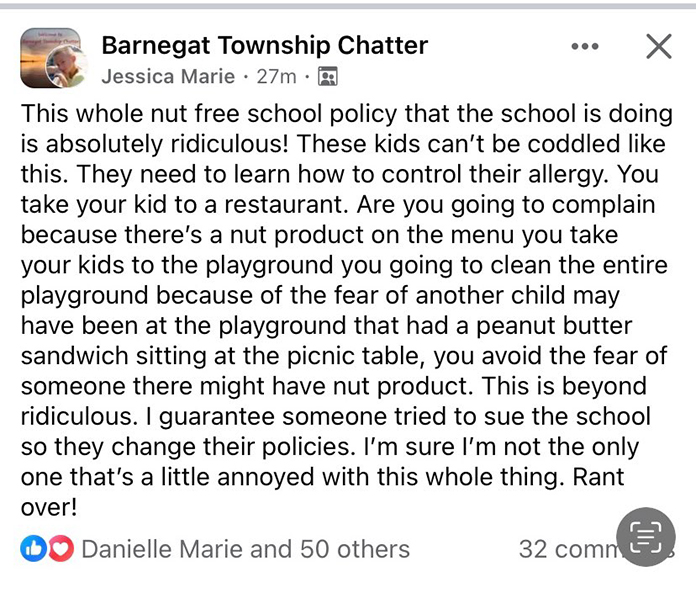
BARNEGAT – Candace Laskowski will never forget the phone call. Her babysitter sent her a picture of Ashton, just 10 months old at the time, and it was terrifying. His eyes were swollen and red, and his skin from the top of his scalp down was covered in hives, blotchy red marks, and welts.
Without hesitation, Candace told the babysitter to rush him to the nearest hospital. There, doctors immediately gave Ashton epinephrine, an intravenous steroid, along with Benadryl. Up until that moment, no one knew that Ashton was allergic to peanuts – and it wasn’t as if he’d ingested them himself.
The babysitter explained that Ashton’s brother had kissed him on the face after eating a peanut butter and jelly sandwich. That innocent kiss triggered the severe, potentially life-threatening allergic reaction.
Stories like Ashton’s led Barnegat Schools to initially implement a nut-free policy at the Cecil S. Collins School, where nearly 10 percent of the K-2 student population has life-threatening nut allergies. The district didn’t want to take any chances.
When the nut ban news broke, social media lit up with strong reactions. Some people offered support and suggested alternatives to send for lunch for picky eaters. Others expressed their outrage that a minority was receiving special treatment. Comments ranged from calling children with nut allergies “soft” to even suggesting kids should bring peanut butter sandwiches to share with their allergic classmates.
“This whole nut-free school policy that the school is doing is absolutely ridiculous,” wrote someone on Facebook. “These kids can’t be coddled like this. They need to learn how to control their allergy.”
Candace and her husband Stephen are quick to point out that children in the Collins School are still young and are learning to advocate for themselves. Ashton, who’s now in second grade, proudly told this reporter that he politely asks people not to give him things with nuts when he’s out trick or treating on Halloween.
“Mommy and Daddy also go through our things and make separate piles of things with nuts and without,” said Ashton.
However, Ashton cannot yet read or comprehend nutritional information on foods, and his parents recognize the associated risk that comes from a lack of understanding. They also related Ashton’s sadness that he couldn’t eat certain foods.

Another second-grader’s parent who is not on social media was quite distressed when she learned of the response from some members of the community.
“They’re not the ones who have to watch their child strapped to a gurney with a mask on their face,” she said. “Unable to breathe and limp because of a simple little thing that could have prevented it. They’re not the ones who have to stab their kids with an Epi-pen.”
Nut-Free Policy And New Updates
Principal Nora Green sent the initial letter to Collins School parents in early September requesting they avoid sending peanut and nut products in their children’s lunches. This included peanut butter, Nutella, and snacks with nuts. She explained that the goal was to reduce the risk of exposure for students with severe nut allergies.
Green also added that the same guidelines would apply to snacks and party foods. She suggested using non-food items for birthdays and special occasions to keep everyone safe. Sharing food in class or during lunch would not be allowed.
A follow-up note indicated that the policy only applied to school hours. It would not affect community-based activities held outside of school hours, where children would be supervised by their families.
Just before publication, it was determined that the district planned to update the policy with Green acknowledging its impact on families. She said school officials further researched the policy, consulted with the school physician, and discussed options with parents.
Going forward, the school will focus on educating families about food allergies with help from Red Sneakers for Oakley. While the nut ban for lunches brought from home to the cafeteria will be lifted, no outside food or beverages will be allowed for birthdays or class parties. Instead, parents can pre-order food through Nutri-Serve for these events.
Nutri-Serve is the school’s food services vendor and will prepare treats and treat bags at a reasonable price with allergy-friendly options.
Board of Education President Scott Sarno highlighted two key policies related to managing life-threatening allergies in schools.
The first policy aligns with federal law, recognizing allergies as a medical condition under the Americans with Disabilities Act.
The second policy requires the school district to create and enforce strategies to reduce the risk of exposure to food allergens. This applies throughout the school day, during before-and-after-school programs, school activities, and in the cafeteria.
“Our biggest concern is the safety of our students,” Sarno said. “That’s paramount.”
Candace said that Ashton was entitled to a 504 plan because of his allergies and appropriate accommodations as a student in a public school system.

“It’s about equity, not about exclusion,” she emphasized. “I’ve been a very strong advocate for Ashton and pushing for certain practices and measures to not just protect him, but also ensure that he feels included and not segregated while at school.”
Superintendent Dr. Brian Latwis shared his participation in roundtable discussions with parents and school leaders. He said that the district always prioritizes student safety first.
“We are grateful for parent’s cooperation, patience, and support as we investigated the matter,” said Latwis. “As well as discussed with various stakeholder groups in order to make an informed decision going forward.”
Life-Threatening Allergies: The Basics
Both the district and the parents who discussed their food allergies acknowledged that the allergies are not just limited to nut allergies. However, the extraordinary number of children with nut allergies in the Collins School is what led to the implementation of protective measures.
Peanut allergies are particularly common in children and can cause severe reactions. The Centers for Disease Control report that food allergies among children have increased by 50% since the late 1990s. While theories about the rise in food allergies exist, the exact cause remains unknown.
The district’s decision to partner with Red Sneakers for Oakley stands to educate both parents and students. The non-profit was organized in memory of Oakley Debbs, an 11-year-old boy who died due to a fatal anaphylactic reaction to walnut extract.
According to Red Sneakers and other experts, food allergies occur when the immune system mistakenly treats a food as harmful, potentially causing serious reactions. The allergy does not even have to appear with the first exposure. Food intolerance, in contrast, affects digestion and leads to discomfort but is not life-threatening.
Allergic reactions can vary widely. They often begin with skin issues like hives but can escalate to more severe symptoms such as low blood pressure and breathing difficulties, which can be life-threatening. Even trace amounts of an allergen can trigger a reaction, and reactions may occur from ingestion, skin contact, or inhalation. And, a once mild episode can become worse after a subsequent exposure.
Anaphylaxis is a severe, rapid allergic reaction that can be fatal. Immediate treatment with an epinephrine auto-injector is crucial. Symptoms may start within minutes of exposure or up to a few hours later.
Candace said that the general public may not be aware that there are co-factors that can complicate anaphylaxis, including heat and exercise.
“Kids could be having exposure in the cafeteria, not realize it, go to gym, be active and working out and sweating,” she said. “That could create a more fatal reaction as well.”
One of the distinct differences with nut exposure for those with other food allergies also involves paying attention to handwashing and cleaning surfaces. Hand sanitizers do not act effectively to combat nut proteins.
“It’s not like your other proteins like meat and eggs that have an eventual shelf life,” Stephen explained. “If someone eats a peanut butter and jelly sandwich, and nobody cleans and sanitizes the table with soap and water, the oils are still there. That’s a big problem for kids with nut allergies.”
Stephen, who coaches soccer and football in the community, said he expected some negative backlash when the school district decided to put some safety measures in place. However, he was shocked to see some suggest that it was all about “survival of the fittest.”
“My husband’s the one for the kids on his team who have asthma or who have a seizure disorder, and he’s the one who’s carrying their kids off the field,” shared Candace. “He’s the one who’s getting them their inhaler when they need it or getting medical attention.”
Both families with children who have severe allergies expressed a shared hope: that growing awareness and education about the rising prevalence of food allergies will foster greater empathy and understanding from others.







